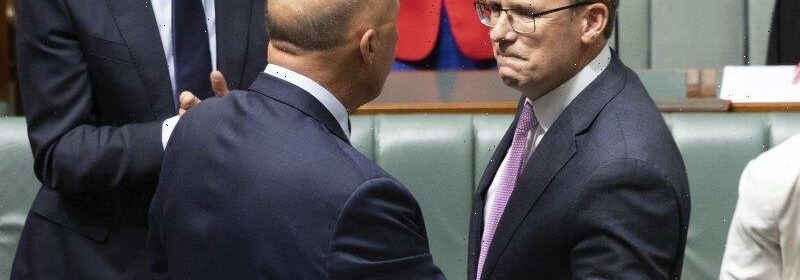The ghosts of Alan Tudge’s past haunt him until the end

When they enter parliament, some politicians appear destined for controversy. Alan Tudge wasn’t one of them. In the early years of his time in politics, Tudge came across as an unremarkable figure.
Yet when he retired from politics on Thursday, he put an end to a career that, in its final years, became dominated and derailed by scandal. Tudge had been involved in plenty of policy controversies, but it was his tumultuous personal life that caused the most damage. To his critics, he was a #MeToo villain; to his allies, a victim of a vicious character assault.
Alan Tudge with Opposition Leader Peter Dutton, who spoke of the attacks endured online by politicians on all sides.Credit:Alex Ellinghausen
As Tudge, 51, rose after question time to deliver his resignation speech, eight of his Liberal Senate colleagues visited the House of Representatives to pay their respects.
Watching above in the public gallery was Rachelle Miller, the former Tudge staffer who publicly accused him of emotionally and physically abusing her during a romantic affair. Wearing a plain white shirt, Miller sat alone, watching silently. She had come, she told confidantes, to gain a sense of closure after a traumatic period in her life. At one stage she was seen wiping away a tear.
Tudge began by saying his three children had put up with things “no teenager should have to, including death threats as recently as last week. Putting aside partisan differences, Anthony Albanese and Peter Dutton paid tribute to Tudge and agreed politicians’ families were often subject to vile abuse on social media.
“The online environment has created an opportunity for spineless people, and people without the integrity of most decent Australians, to conduct themselves in a way that they should be ashamed of,” Dutton said. In Tudge, he said parliament had lost a man of “great intellect”.
Before entering parliament in 2010 as the member for Aston, in Melbourne’s eastern suburbs, Tudge was a management consultant and an adviser to Brendan Nelson and Alexander Downer. He also served as deputy director of Noel Pearson’s Cape York Institute. As Tudge explained in his farewell speech, he was an unusual Liberal in that he was always most drawn to social policy rather than economics or national security.
A member of the party’s conservative wing, he supported Tony Abbott when Malcolm Turnbull challenged him in 2015. Three years later he supported Dutton in the showdown against Turnbull and Scott Morrison.
“I especially thank Peter Dutton, Scott Morrison and Tony Abbott for their leadership, support and strength,” Tudge said in his valedictory address. Notably absent from the list was Turnbull, who made a cryptic reference to Tudge’s affair in his 2020 memoir A Bigger Picture.
As human services minister, Tudge oversaw a ramp-up in the now disgraced robo-debt scheme. The royal commission into the illegal scheme heard last week that Tudge’s office released private information about welfare recipients who complained about the debt recovery scheme to the media.
As education minister, Tudge warned that changes to the national history curriculum could lead to students developing “a hatred” of Australia and hearing “fringe” ideas about Anzac Day.
Victorian Education Minister James Merlino accused him of promoting “ham-fisted culture wars rubbish”. In his farewell, Tudge said he still hoped the government would pursue a “more positive” view of the nation.
In 2020, Miller revealed on the Four Corners investigation, Inside the Canberra Bubble, that she and Tudge had an affair. Tudge confirmed their relationship crossed professional boundaries and that it had caused the end of his marriage.
Miller later expanded her complaints against Tudge, accusing him of bullying and intimidation, as well as emotional and physical abuse. Tudge strenuously denied the allegations, but stood aside from his portfolio while the matter was investigated. It emerged during last year’s election campaign that he was still technically a member of cabinet.
Vivienne Thom, the former intelligence official tasked with investigating Miller’s allegations, found there was “insufficient evidence” to support a finding that Tudge had bullied or harassed Miller, or that their relationship was emotionally or physically abusive. There was no basis, she added, to support a finding that Tudge breached ministerial standards.
Miller, who did not participate in the inquiry, later received $650,000 payment from the Commonwealth. Tudge said he had no involvement in the payment or knowledge of it.
As he neared the part of his speech where he thanked his family, Tudge choked up and struggled to continue. A parliamentary clerk brought him tissues; colleagues brought him glasses of water. He regained his composure and made it to the end.
As Tudge’s colleagues applauded, Miller rose and left the chamber. The ghosts of his personal life haunted his political career until the very end.
Cut through the noise of federal politics with news, views and expert analysis from Jacqueline Maley. Subscribers can sign up to our weekly Inside Politics newsletter here.
Most Viewed in Politics
From our partners
Source: Read Full Article
